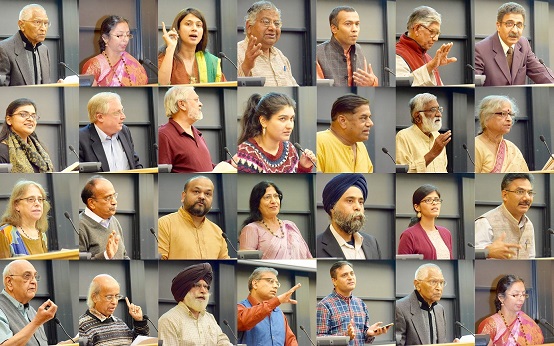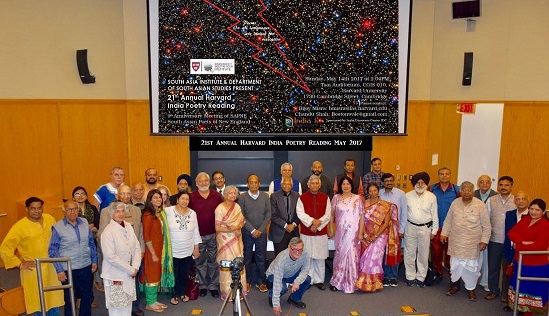Contribute
| ‘Truth’ - South Asian Poets Of New England Explore Through Poetry |
Amandeep Singh
05/24/2017
A report of the 21st Annual India Poetry Reading at Harvard University Amandeep Singh ‘Who knows what the truth is? From the ocean of darkness, light emerged and developed. Whatever followed we don't know, only poets told us!’ Mother’s Day, Sunday, May 14, 2017, 2:00 PM, Tsai Auditorium, Harvard University, Cambridge. It was a damp day, raining intermittently. But it didn’t dampen the spirits of the poets who gathered for the 21st Annual India Poetry Reading at the University. The event initiated in 1997, was sponsored by the Department of South Asian Studies of Harvard University and was hosted by the South Asia Institute of the University. The event celebrated the 9th Annual Meeting of South Asian Poets of New England, an informal group of poets associated with the local India Discovery Center. Twenty seven poets participated. The topic for the afternoon was “Truth.†What is Truth? Is Truth God? What is God? Does God exist? Where is his abode? What is life? Nobody knows, only poets tell us. How do poets know? Even God might not know what he created! Is all truth or untruth? Untruth of today could be truth of tomorrow. Does it evolve with time? Is Truth absolute? Does it have a smell or color? Tagore said, “Truth is hard but I love the hardâ€. For children, truth is personal. Is there one truth for all? Let there be many truths and let them co-exist. You can look for it in the history, but you may not find it. Sometimes you may meet it inside your own house! We are told to be truthful. How many of us have the courage to speak truth? What happens when we speak the truth? Truth always gets crucified. Lies flourish. Sometimes we find truth mauled in a street corner. People don’t treat it well; they like liars. Those who stand for truth are called traitors by the rulers! Is truth a fake news or is fake news truth! Is the truth a version of the exploited or that of the exploiter? People spend too much time discussing it. Is truth politically correct? Anything in front of you is truth. It is a reality in the virtual world. Reality is that in this world millions of people are homeless and do not have enough food. People are dying and being displaced because of the wars in various parts of the world. Environment is destroyed by pollution. Hate and discrimination are on the rise; human rights are being abused every day. Still there is a glimmer of hope on the distant horizon… love and compassion could be the answer! … And whenever there will be discussion of truth, people will remember legendary King Harishchandra, who sold himself and his family for the truth. Prof. Bijoy Misra, the convener of SAPNE, opened the meeting by remembering how it all started to celebrate diversity of India by its many languages, poetry and expression. He thanked Chandu Shah for help with SAPNE and acknowledged support of many veteran poets who form group. He then invited Prof. Vimal Praksh Jain, a Pali and Prakrit scholar, and an expert in Jaina philosophy, to recite a few couplets from Samana Sutta, the Jaina Scriptural poetry of pre-vedic origin. Prof Jain enunciated that there is no origination without destruction and no destruction without origination. He explained the ancient pluralistic views of Jainism and stated the belief that a “substance†is basis of things. Substance remains but mode changes. The mode of the substance is none other than the substance itself! Srilakshmi Srinivasan presented a beautiful musical rendition of the Nasadiya Sukta from the Vedas. It was composed to music for the Vedic study conference in January. Bijoy Misra gave a concept translation in Oriya through a poem Sata o Asata. Who knows what the truth is? From the ocean of darkness, light emerged and developed. Whatever followed we don't know. Was it untruth, truth or nothing? Who would know? Madhukar Shah, a Gujarati and English poet, recited his poem “The Absolute Truth†written in line of the Upanisadic teachings. The absolute truth is not the body, mind or intellect, it is the internal presence. It transcends time. Nilam Kaushik, a visiting doctoral student, recited her Urdu poem Mere Hissay ka Sach “My part of Truthâ€. She contended that life was a quest to move from lower to higher levels of "truth". She wondered about her share of the precious truth. In his Hindi poem, Satya ki Khojme “In search of Truthâ€, poet Amit Khare reflected that truth is like a pearl in a dark ocean. After finding out the truth, the eyes would shed tears and the pride could vanish. Poet Alok De in his Bengali poem Satya Ta Ki “What is Truth?†wondered about smell, touch and color of Truth. Is it a star in the sky? Is it Satymeva jayate, “truth always winsâ€, or does It appear the other way around? Muneebur Rahman recited his Kasmiri poetm Treh Yaar “Three Friendsâ€. The poet remembered three friends, happy and basking in the golden rays of the sun under a Chinar tree. Alas! wind, flood and fire scattered them all. Swetha Rajeswaran recited the Tamil poem Illadha Thalaippu “Non-existent Title†written by poet Atmanam (1952-1984). She translated the poem into English. Poet says that he existed not knowing that he exists. There is a “Real I†and an “Apparent Iâ€. The poet realizes that he is neither! Mike Steinmetz in his English poem “I am†wondered who he was. “I am the grammar of life, ears of color and eyes of the sound. I am the reflection of the audience!†Prem Nagar recited his Hindi poem Satya Asatya Samaya Antaral “Truth, Untruth and Time Lag†- Untruth today could be truth of tomorrow or vice-versa. What is truth? Does it evolve with time? Maneesh Srivastava rendered a poignant poem presenting the condition of the truth – Yahi Sach Hai “This is truthâ€. Truth is misery personified. It lies on the side of road – apparent or not. Lie enjoys its good time! Nobler Truth gets frozen in the scriptures! Jayant Dave in his Gujarati poem Bikruta Sandesh “Truth is Fake News†questioned the validity of fake news surfacing on the Internet. Truth is fake news or is fake news made truth? Poet wanted to see the truth in its absolute form. He discovers that Truth could be like an element in the periodic table! Jaspal Singh beautifully rendered his Hindi poem Aaj ka Sach “Truth Today†composed in raag Tilk Kamod. He contemplated on the current political scenarios where leaders make false promises. People who stand for truth suffer in jails. How can you tell the truth where the lie rules? Maya De in her Bengali poem Satya and Abahaman Kaal “Truth and ever-flowing time†remembered that the Sages said 'speak the truth- follow the path of virtue- swerve not from the study of scriptures'. Tagore said 'Truth is hard- but I loved the hard'. She wondered “but what about us?†She compared the truth of the Indian societies of 1960's with the truth of 2017. Rosie Kamal recited a Bengali poem Samabyathi “Empathizer†written by Rabindranath Tagore (1861-1941) Nobel Laureate in Literature. The poem was translated to English by Sajed Kamal. For children, truth is personal. It lives in the present and is about what matters most. In this delightful composition, a child challenged his mother to be truthful. R. Balachandra recited his English poem “Monsters and Truthâ€. A child sees monsters where there are none. One sees murder while another sees suicide. Is there one truth for all? He concluded “Truth is what you believe!†Srabonti Bandyopadhyay, recited a poem written by her father Amitava Ganguly “Truth – Relativity Redux.†Relativity being the crux; history records the story of the exploited and the exploiters. Poet looks for Truth in history but is unable to find it! Neena Wahi recited her Hindi poem Sach se Mulaqaat “Meeting Truthâ€. We are told to be truthful since childhood. How many us have the courage to speak truth? Truth is harsh, hard and tough to maintain. Truth slowly vanishes from our lives and we have to search it again and again while the life goes on. Amandeep Singh sang his Punjabi poem Sach Nu Fansi “Crucifixion of Truthâ€. What happens when you speak truth? Here in this world truth is always crucified and lie flourishes. But in the end, truth must prevail. It can never die like the eternity of God’s name! Poppy Awashti-Charnalia recited her eloquent Urdu poem Haqiqat “Truth in Lifeâ€. People spend too much time discussing the truth. Poet wished for a dagger with power to reveal the truth! Sanjeev Tripathi recited his Hindi Poem narrating the legendary story Harishchandra ki Pariksha “Test of Harishchnadraâ€. King Harishchandra gave away his kingdom, sold himself and his family, and agreed to be a slave to maintain the truth of his words! Chandu Shah recited his Gujarati poem Aa Dunuaa maa “Because we are Born Hereâ€. The poets and artists belong to this world only because we are born here. The truth is we don't belong to any place and time! Anything in front of us is the only truth. There is no truth in dreams, relations, flowers etc. Sajed Kamal recited his English poem “The National Day of Mourning, November 25, 2016â€. A plea for the truth in history is a running theme for Native Americans on the National Day of Mourning, otherwise known as Thanksgiving Day. The poem was a narration in which Native Americans and non-Native Americans gathered annually in Plymouth, Massachusetts, to commemorate the Day. Sarbjit Singh recited an English poem titled “Love is the Answerâ€. True love can conquer hate. If you realize love and truth, then you despise hate. Preetpal Singh recited his satirical but seriously themed Punjabi poem Khush Kismat “Happy Lifeâ€. The poet observed that we are happy and lucky as we have roof on our heads but we forget that there are millions of people in the world who are homeless and hungry. One uses “google†to learn how many people in the world are homeless. “Google†can sometimes tell you the truth! Rahul Dutta Sharma recited a Hindi poem titled Satya Ka Satya “Truth's Truthâ€. The definition of truth for everyone is driven by context and circumstances. Sometimes what is visible to naked eye and audible to naked ear may not be the correct representation of what the ultimate truth is. Srilakshmi Srinivasan concluded the assembly with an English composition “Truth is..â€. Truth can take any form you like it to be. It can cause various emotions. But Truth never changes with time. Being truthful is important and Truth is what you believe! All poets gathered for a group picture. Bijoy Misra thanked all particularly to Hera Shakil, a student from the Graduate School of Education, who assisted the program on behalf of the South Asia Institute. A reception with snacks and tea followed. A sample of the voices recorded by poet Maneesh Srivastava can be viewed at https://youtu.be/MiONrKzqepg. Poet Chandu Shah took the pictures. The next quarterly meeting of SAPNE is scheduled for August 20. Please check http://southasiapoets.wixsite.com/sapne for the details. ‘Truth’ - South Asian Poets of New England explore through Poetry -
You may also access this article through our web-site http://www.lokvani.com/

